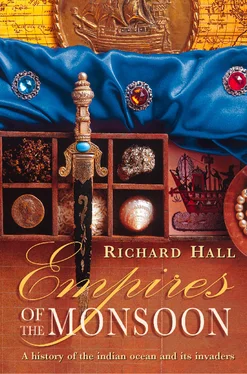‘As for accompanying you to your ship,’ he says, ‘I have my reasons for not doing that.’
With its pointed ironies, the tale of the black king and his white captives would have amused an Islamic audience. The closing message of brotherly reconciliation fitted well with a popular defence of slavery: that Africans so respected their masters that they bore them no grudges. In reality, however, slaves did not always submit quietly to being dragged from their tribes, their villages and the sheltering African forest. There was an Arabic saying: ‘If you starve a Zanj he steals, if you feed him he becomes violent.’ It reflected the fear that slaves would always seek a chance for revenge.
History reveals that they often did. As early as A.D. 689, less than sixty years after the death of Muhammad, there was an uprising by slaves working in the swamps near Basra, at the mouth of the Tigris and Euphrates rivers. It did not last long, and the bodies of the rebels were left hanging from their gallows as a warning. Five years later the slaves rose up again, led by an African called Riyah, ‘The Lion of the Zanj’. This time the defiance was better organized and was not put down until 4,000 troops, also black, were let loose in a campaign of extermination. Ten thousand slaves, including women and children, were massacred.
In the middle of the ninth century a still more ferocious event took place: the third ‘Revolt of the Zanj’. This happened during a period of widespread disorder, when there was a host of military and religious challenges to Islam.
A constant threat came from the radical Shi’ite movement, one of the two great contending forces of Islam. The Abbasid dynasty had chosen the other, the Sunni orthodoxy. The Shi’ites, who had helped to put the Abbasids in power, now felt rejected. They were also hostile to the luxurious habits of the caliphs. Power was fragmented, with the law in the hands of the Arabs and the Persians controlling the administration. The army was run by Turks, who were always prone to mutiny.
In the confusion leading up to the third ‘Revolt of the Zanj’ it was a Shi’ite who took advantage of the revolutionary possibilities. 6He was a visionary zealot named Ali bin Muhammad – a Persian, but partly of Indian extraction. As a young man he had led an uncertain life, writing poetry and wandering through the deserts with nomadic tribes. Clearly, he had messianic instincts, probably stimulated by his fanatical father, who is reputed to have had a dream, when Ali was still a child, that his son would grow up to destroy Basra, their home-town. As an adult, Ali made it known that he could see writing done by an invisible hand, and could read the thoughts of his enemies. These claims, similar to those being made by ‘holy men’ elsewhere during this time of fanaticism, brought round him a clique of dedicated followers; they included some petty businessmen, including a miller and a lemonade seller.
His verses, of which more than a hundred survive, express his contempt for the self-indulgent rulers of Islam.
How my soul grieves over our palaces in Baghdad and who they contain – every kind of sinner -
And for wines openly drunk there, and for men lusting after sins.
He did not conceal the way his thoughts were moving:
Submissively to adopt a moderate stance is humiliation for God’s servant.
When the spark will not catch, I will fan it;
When some leave the sharp blade in its sheath on the day of battle, others will draw theirs.
Shortly before the Zanj slaves rose in revolt, Ali had been in Bahrain. When he went home to Basra he was, unsurprisingly, viewed by the authorities as a potential troublemaker; although he escaped into hiding in Baghdad, his wife and children were jailed. In August 869, Ali’s moment arrived. There was near-anarchy in Basra, the governor had fled, and prisoners had been freed from the jails.
He returned to Basra and made his way to the workshops where masons prepared materials for restoring and enlarging the canals, and to the sugar plantations in the surrounding marshes. Before him was carried a banner, embroidered with a Qur’ānic verse, calling on the faithful to ‘fight on the road of Allah’. He proclaimed a ‘war to the knife’. His first recruits were 15,000 slave labourers, men condemned to work in heat and dust until death, flogged at the whim of their masters. They had little to lose.
Their new leader boldly went around the camps, ordering the black slaves to rise and beat their masters. They obeyed, giving them 500 lashes each. The Arab historian al-Tabari, living at the time of the revolt, even names some of the black lieutenants gathered around Ali, whom he piously vilifies as the ‘Wicked One’: al-Bulaliya, Abu Hudayd, Zurayq, Abu al-Layth. The greatest of the Zanj commanders was Mohallabi, who would fight to the very end.
For some years the uprising was to threaten the very heartland of Islamic power and ranks as one of the greatest slave uprisings in history, comparable with that led by Spartacus against imperial Rome. Today the event can only be re-created from obscure Arabic chronicles, but parts of it have a remarkably familiar ring after more than ten centuries, for at the same time as rebellion broke out in the marshes around the mouth of the Tigris river, the Kurds were also waging war.
Battle was soon joined by the makeshift army of slaves, against government troops equipped with swords, bows and arrows, and lances. No quarter was given on either side, all captives being put to death. The slaves’ leader himself was a prime executioner, setting the example by decapitating one man just as he was pleading for mercy. The heads of the defeated were borne as trophies from the battlefield on the backs of mules. Once a whole boatload of heads was floated down the river to Basra.
As the slaves advanced through the swamps towards the great city, Ali maintained the trappings of a holy man. He rode a horse with palm leaves as a saddle and a piece of cord as a bridle. Before the battles he made stirring speeches to the Zanj, urging them on to victory. They put their faith in his magical powers.
There were setbacks: after one battle, Ali was forced to flee into the swamps and found himself with only 1,000 remaining followers, men and women. Although this might have seemed like the end of the revolt, the rebels were to win their next fight, with only stones as their weapons. Ali declared that supernatural powers had saved them, and recruits flowed in once more to sustain the revolt. Soon the slave armies became irresistible, spreading out through the whole region at the mouth of the Gulf. They pillaged the homes of the rich, auctioned off thousands of high-born Arab and Persian women as concubines, and cut all links between Baghdad and the Indian Ocean.
Leaders of the ruling Abbasid dynasty now saw that the black Zanj might represent a direct threat to Islam, because they were gathering support from other dissident groups, including Persians, Jews and Christians. It was fortunate for the caliphs that the rebels never formed any effective military alliance with the Kurds or the heretical Carmathians, but by the year 871 the Zanj were strong enough on their own to mount a direct assault on Basra, obeying Ali’s plan for a three-pronged attack. It was led by the general Mohallabi. Two years earlier the citizens had beaten back the Zanj, but now the city was overrun and everybody unable to escape was killed. Some leading citizens were put to the sword as they prayed in the main mosque.
The caliph at Mu’tadid sent south a more powerful army than had ever been assembled, with the aim of dealing out merciless punishment to the Zanj. But once again Ali was victorious. His followers paraded before him, each one holding in his teeth, by the hair, the head of a victim. The slaves had now decisively turned the tables on their masters in Baghdad and Samarra, a new capital higher up the Tigris.
Читать дальше












